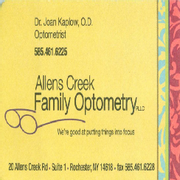The importance of eye exams after Cataract Surgery

Cataracts are a common age-related condition that causes the lens of your eye to become cloudy over time. This is very treatable via surgery, which can improve your vision along with your quality of life. Follow-up eye exams are crucial after these procedures, both to ensure proper healing and to update your eyeglasses prescription if necessary. Here are a few key points to keep in mind.
What to Expect During Cataract Surgery
During the procedure, your doctor will remove the cloudy lens and replace it with an artificial intraocular lens. You'll be provided numbing eye drops to reduce discomfort during the surgery. You may also be given a sedative to help you relax, in which case you should have someone drive you home from the appointment. The entire procedure usually takes about 45 minutes.
Most cataract surgeries are performed on an outpatient basis. The total recovery period takes about eight weeks, and most people experience minor discomfort during the first few days. However, these procedures are quite common and very effective at restoring one's vision. You may even notice a vision improvement on the first day after your surgery.

How the Procedure Can Change Your Prescription
Many intraocular lenses are designed to provide 20/20 vision to patients after the surgery is complete. As a result, some people no longer require eyeglasses as they did previously. However, this depends on other vision issues you might experience.
People with existing refractive errors often need prescriptions adjusted during the recovery process, which occurs during subsequent eye exams.
The Follow-Up Eye Exam
Follow-up eye exams allow the doctor to determine the quality of your vision and whether you require an additional prescription.
Monofocal intraocular lenses only correct one type of refractive error, whether you're nearsighted or farsighted. In this case, an exam allows your doctor to test your eyes to determine whether you need glasses to see up close or far away. You may be prescribed readers if your close-up vision is compromised, or your doctor might recommend glasses to improve nearsightedness or astigmatism.
Allens Creek Family Optometry has helped patients with a wide range of vision issues throughout Rochester, NY, and the surrounding area. Drs. Joan Kaplow, Jennifer Bateman and Arian Farrands have decades of experience, and their team is committed to treating every patient with the kindness and compassion they deserve. Learn more about their eye exams by visiting the website or call (585) 461-6225 to schedule an appointment.
About the Business
Have a question? Ask the experts!
Send your question

